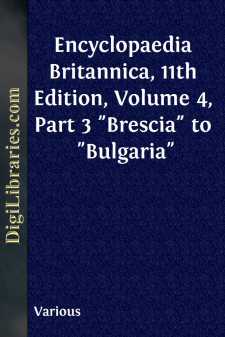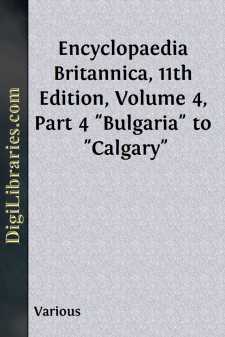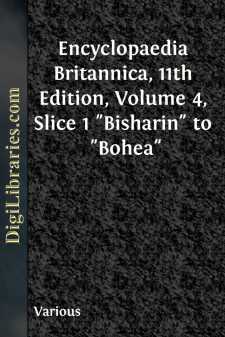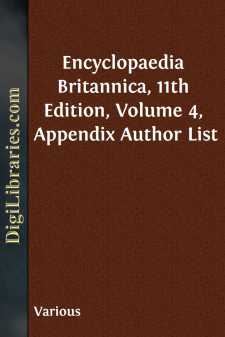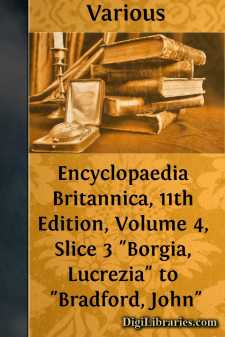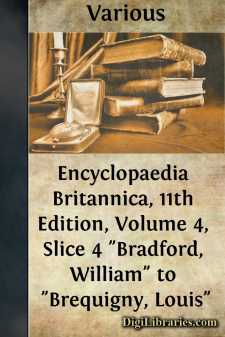Reference
- Atlases 1
- Bibliographies & Indexes 10
- Catalogs 55
- Dictionaries 1
- Encyclopedias
- Etiquette 14
- Handbooks & Manuals 19
- Heraldry 2
- Quotations 9
Encyclopedias Books
Sort by:
by:
Various
AUSTRIA, LOWER (Ger. Niederösterreich or Österreich unter der Enns, "Austria below the river Enns"), an archduchy and crownland of Austria, bounded E. by Hungary, N. by Bohemia and Moravia, W. by Bohemia and Upper Austria, and S. by Styria. It has an area of 7654 sq. m. and is divided into two parts by the Danube, which enters at its most westerly point, and leaves it at its eastern...
more...
by:
Various
BENT, JAMES THEODORE (1852-1897), English traveller, was the son of James Bent of Baildon House, near Leeds, Yorkshire, where he was born on the 30th of March 1852. He was educated at Repton school and Wadham College, Oxford, where he graduated in 1875. In 1877 he married Mabel, daughter of R.W. Hall-Dare of Newtownbarry, Co. Wexford, and she became his companion in all his travels. He went abroad...
more...
by:
Various
BRESCIA (anc. Brixia), a city and episcopal see of Lombardy, Italy, the capital of the province of Brescia, finely situated at the foot of the Alps, 52 m. E. of Milan and 40 m. W. of Verona by rail. Pop. (1901) town, 42,495; commune, 72,731. The plan of the city is rectangular, and the streets intersect at right angles, a peculiarity handed down from Roman times, though the area enclosed by the...
more...
by:
Various
BULGARIA (continued from part 3) ... the mean interval being 60 m.; the summits are, as a rule, rounded, and the slopes gentle. The culminating points are in the centre of the range: Yumrukchál (7835 ft.), Maragudúk (7808 ft.), and KadimlÃa (7464 ft.). The Balkans are known to the people of the country as the Stara Planina or "Old Mountain," the adjective denoting their greater size as...
more...
by:
Various
BISHÂRÎN (the anc. Ichthyophagi), a nomad tribe of African “Arabs,” of Hamitic origin, dwelling in the eastern part of the Nubian desert. In the middle ages they were known as Beja (q.v.), and they are the most characteristic of the Nubian “Arabs.” With the Abâbda and Hadendoa they represent the Blemmyes of classical writers. Linguistically and geographically the Bishârîn form a connecting...
more...
by:
Various
INITIALS USED IN VOLUME IV. TO IDENTIFY INDIVIDUALCONTRIBUTORS, WITH THE HEADINGS OF THEARTICLES IN THIS VOLUME SO SIGNED.A. B. R.Alfred Barton Rendle, F.R.S., F.L.S., M.A., D.Sc.Keeper of the Department of Botany, British Museum.{Botany.A. E. H.A. E. Houghton.Formerly Correspondent of theStandardin Spain. Author ofRestoration of the Bourbons in Spain.{Cabrera.A. E. S.Arthur Everett Shipley, F.R.S.,...
more...
by:
Various
BORGIA, LUCREZIA(1480-1519), duchess of Ferrara, daughter of Cardinal Rodrigo Borgia, afterwards Pope Alexander VI. (q.v.), by his mistress Vanozza dei Cattanei, was born at Rome in 1480. Her early years were spent at her mother’s house near her father’s splendid palace; but later she was given over to the care of Adriana de Mila, a relation of Cardinal Borgia and mother-in-law of Giulia Farnese,...
more...
by:
Various
BRADFORD, WILLIAM (1590-1657), American colonial governor and historian, was born in Austerfield, Yorkshire, England, probably in March 1590. He became somewhat estranged from his family, which was one of considerable importance in the locality, when in early youth he joined the Puritan sect known as Separatists, and united in membership with the congregation at Scrooby. He prepared in 1607, with other...
more...
by:
Various
CELTES, KONRAD (1459-1508), German humanist and Latin poet, the son of a vintner named Pickel (of which Celtes is the Greek translation), was born at Wipfeld near Schweinfurt. He early ran away from home to avoid being set to his father’s trade, and at Heidelberg was lucky enough to find a generous patron in Johann von Dalberg and a teacher in Agricola. After the death of the latter (1485) Celtes led...
more...
by:
Various
CAT,properly the name of the well-known domesticated feline animal usually termed by naturalistsFelis domestica, but in a wider sense employed to denote all the more typical members of the familyFelidae. According to theNew English Dictionary, although the origin of the word “cat” is unknown, yet the name is found in various languages as far back as they can be traced. In old Western Germanic it...
more...




